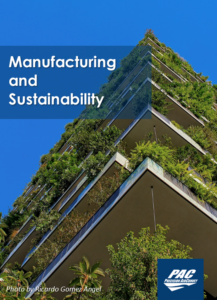
Sustainability in manufacturing is becoming increasingly important as both consumers, businesses and governments are placing more emphasis on environmentally-friendly practices.
Due to the use of paper pulp, adhesives, ink, including the waste they generate, the printing, label, and converting industries have a significant impact on the environment. By implementing sustainable practices, these industries can reduce their environmental impact, lower operating costs, and promote a culture of environmental responsibility.
One of the key areas where sustainability can be incorporated is through the use of environmentally-friendly materials. This includes using paper and other materials that are made from sustainable sources, such as recycled or FSC-certified paper, and using adhesives and inks that are free of harmful chemicals.
Energy efficiency is another important aspect of sustainability. The use of energy-efficient equipment and the implementation of energy management systems can greatly reduce energy usage and resulting greenhouse gas emissions. Furthermore, the use of renewable energy sources such as solar and wind power can help reduce the industry’s reliance on fossil fuels.
Waste management is a crucial component of sustainability. The widely known sustainability principle of “Reduce, Reuse, Recycle” is intentionally listed in order of importance. The primary focus is on reducing waste, followed by reusing materials, and finally, recycling what is left. PAC plays a significant role in addressing all three aspects of “the 3 ‘Rs’”. By utilizing PAC systems, raw material consumption can be decreased by 2-3%, a conservation metric that when extrapolated across multiple industries can be staggering. Moreover, the implementation of closed-loop systems, which involve reclaiming and reusing materials multiple times, can effectively decrease waste generation, and byhaving the tools to effectively introduce recycling and composting programs, companies can ultimately significantly reduce the quantity of waste that is sent to landfills.
Sustainability also extends to the manufacturing process itself. This includes implementing practices such as lean manufacturing, which reduce waste and increases efficiency, and using environmentally-friendly manufacturing processes, such as those that reduce emissions and pollution.
Sustainability in manufacturing is essential for protecting the environment, reducing costs and promoting a culture of environmental responsibility. By implementing sustainable practices such as using eco-friendly materials, energy-efficient measures, water conservation, waste management and environmentally-friendly manufacturing processes, the industries can greatly reduce their environmental impact and contribute to a more sustainable future.
LMK 2023
